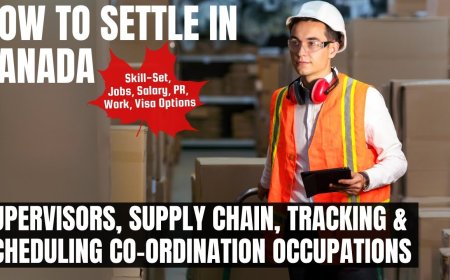Financial auditors and accountants Migration to Canada: A Detailed Guide on Salaries, Professional Responsibilities, and Preferred Locations
Welcome to the pathway to Canada immigration for skilled professionals and trade workers. This guide is specifically tailored for Financial auditors and accountants looking to work and settle in Canada, offering a deep dive into the essential aspects of immigration and employment in this field.
Introduction
Over the past few years, Canada has been experiencing a high demand for financial auditors and accountants, making it an attractive destination for professionals in this field. In this article, we will delve into the profile of Financial auditors and accountants with NOC Code 1111, covering aspects such as their main job duties, education and licence requirements, necessary skills, median and retirement age, salary details, and possible visa options for those looking to pursue a career in Canada. Whether you are already working in this field or are considering a move to Canada to further your career, this article will provide valuable insights into the opportunities available in this industry.
What is the Profile Description of a Financial auditors and accountants as per the Canadian National Occupation Classification (NOC) Standards?
Financial auditors and accountants are responsible for examining and analyzing the financial and accounting records of individuals and businesses to ensure accuracy and compliance with established accounting standards. They also plan, organize, and administer accounting systems for their clients. These professionals are typically employed by private sector accounting and auditing firms, as well as public sector accounting and auditing departments. Some financial auditors and accountants may choose to work independently as self-employed individuals. This unit group may also include articling students who are gaining experience in accounting firms.
What are the Main Job Duties of a Financial auditors and accountants in Canada?
- Examine and analyze financial records, documents, and systems to ensure accuracy and compliance with accounting standards and internal controls
- Prepare detailed reports on audit findings and provide recommendations for improving accounting and management practices
- Conduct field audits to ensure compliance with statutory requirements and regulations
- Plan, set up, and administer accounting systems, prepare financial statements, and provide financial, business, and tax advice
- Supervise and train other auditors, professionals, or administrative technicians in accounting practices
What are the Education, Certifications, and Licensing Requirements to Work as Financial auditors and accountants in Canada?
Financial auditors and accountants must meet specific education and certification requirements in order to practice in their field. This includes obtaining a university degree and completing a professional training program approved by a provincial institute of chartered accountants. Additionally, they must have several years of on-the-job training and be a member of a provincial Institute of Chartered Accountants after passing the Uniform Evaluation. For those pursuing a career as auditors, they must meet the same education and training requirements as chartered professional accountants. Some experience as an accountant is also necessary, and recognition by the Institute of Internal Auditors may be required. In order to act as a trustee in bankruptcy proceedings, auditors and accountants must hold a licence as a trustee in bankruptcy. Furthermore, licensing by the provincial or territorial governing body is typically required for accountants and auditors practicing public accounting. Overall, meeting these requirements ensures that financial auditors and accountants are equipped with the necessary skills and knowledge to carry out their responsibilities effectively.
What Essential Skills are Required for Financial auditors and accountants to succeed in Canada?
Successful financial auditors and accountants require a combination of technical skills and expertise in order to excel in their profession. Essential skills include attention to detail to ensure accuracy and compliance with accounting standards and internal controls, the ability to prepare reports and audit findings, recommend improvements to accounting systems and management practices, conduct field audits to ensure compliance with statutory requirements, plan and administer accounting systems, prepare financial information and statements, develop and maintain cost findings and internal control procedures, analyze financial documents and reports, provide financial, business, and tax advice, and act as a trustee in bankruptcy proceedings. In addition to technical skills, effective communication, problem-solving abilities, and a strong understanding of financial regulations and laws are crucial for success in this field.
What is the Median Age and Retirement Age for Financial auditors and accountants in Canada?
With a median age of 44.0 and an average retirement age of 63.0, skilled professionals working as Financial auditors and accountants tend to have long and rewarding careers in the field. This data suggests that individuals in this profession typically gain significant experience and expertise before retiring. The gap of nearly two decades between the median age and retirement age also highlights the dedication and commitment of these professionals to their work. Overall, this data underscores the importance of experience and knowledge in the financial auditing and accounting profession.
How many job openings exist for Other Financial auditors and accountants in Canada, and what's their provincial distribution?
There are a total of 330 job openings in Canada for the profile of Financial auditors and accountants. Quebec has the highest number of job openings with 171 positions available, followed by Ontario with 66 openings and British Columbia with 37 openings. Saskatchewan has 22 job openings, while New Brunswick has 11 and Nova Scotia has 9. Alberta has 7 job openings, Newfoundland and Labrador has 3, and Manitoba and Nunavut each have 1 opening. The province with the maximum job openings is Quebec, while Manitoba and Nunavut have the minimum number of job openings. Overall, there are ample opportunities for financial auditors and accountants across various provinces in Canada.
What is the hourly wage or salary of Financial auditors and accountants in different Provinces of Canada?
In Canada, Financial auditors and accountants earn varying wages depending on the province in which they work. In the Northwest Territories, they earn the highest wages with a median wage of $51.37 and a high wage of $90.98, while in British Columbia, the median wage is $28.85 with a high of $45.67. In Alberta, Financial auditors and accountants earn a median wage of $41.21 and a high wage of $67.31. In Saskatchewan, Manitoba, and Ontario, the median wages range from $30.53 to $36.92, with high wages ranging from $54.40 to $60.51. In Quebec, New Brunswick, Nova Scotia, Prince Edward Island, and Newfoundland and Labrador, the median wages range from $30.26 to $33.65, with high wages ranging from $48.08 to $53.96. Overall, Financial auditors and accountants in the Northwest Territories earn the highest wages, while those in Prince Edward Island and Newfoundland and Labrador earn the lowest wages. These wage discrepancies reflect the cost of living and demand for Financial auditors and accountants in each province.
What are the various visa options available for Financial auditors and accountants migrating to Canada?
Financial auditors and accountants have a variety of visa options available to them for migrating to Canada. One popular choice is the Express Entry Visa Category, which allows skilled workers to apply for permanent residency based on factors such as age, education, work experience, and language proficiency. Additionally, Financial auditors and accountants may be eligible to apply through Provincial Nominee Programs, which are tailored to the specific needs of each province. Employer Sponsored Work Visas are also a common route for individuals in this profession, as Canadian companies may sponsor qualified candidates for temporary work permits. Other visa options may be open as well, depending on individual circumstances. To learn more about the best visa option for you, schedule an appointment with our immigration professionals today.
Have Questions or Need Assistance?
If you have any queries or require assistance with your immigration plans, we're here to help. Our experienced immigration consultants are ready to provide personalized guidance tailored to your specific needs.
Don't hesitate to reach out and schedule an appointment today. Whether you're seeking clarification on immigration processes, exploring visa options, or need support with documentation, we're dedicated to assisting you every step of the way.
Book an appointment with our team to discuss your immigration goals and receive expert guidance for your journey to Canada.
What's Your Reaction?
 Like
0
Like
0
 Dislike
0
Dislike
0
 Love
0
Love
0
 Funny
0
Funny
0
 Angry
0
Angry
0
 Sad
0
Sad
0
 Wow
0
Wow
0






































































